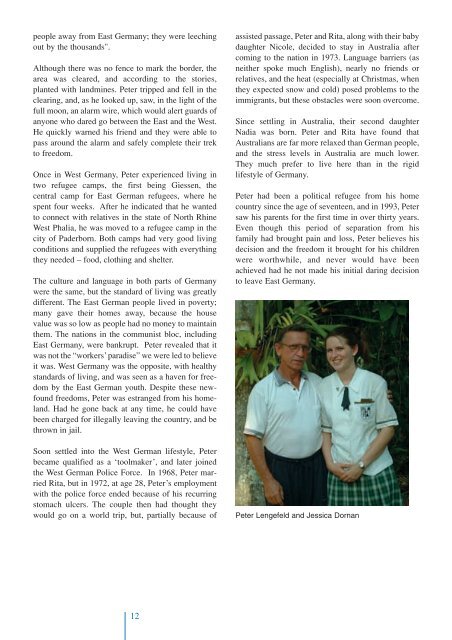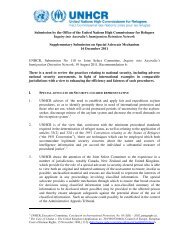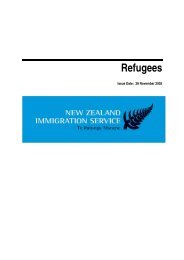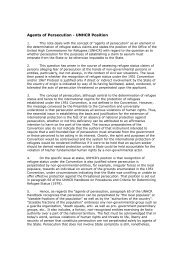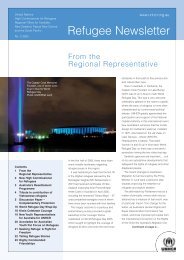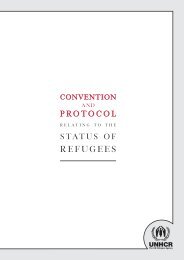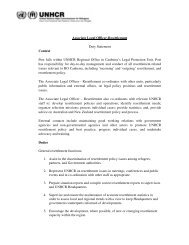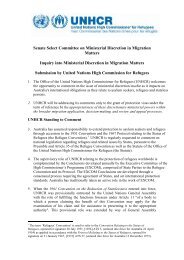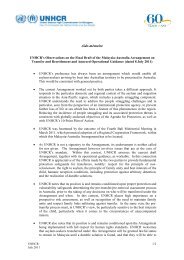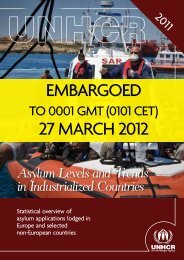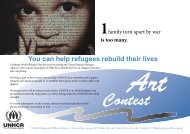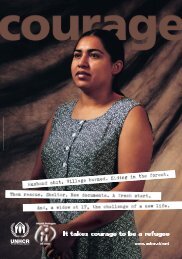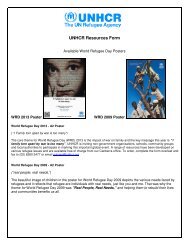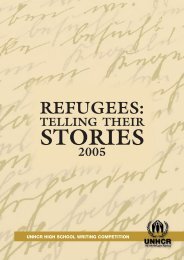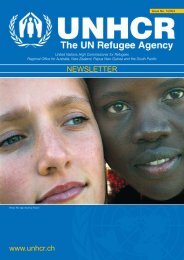5175_ cover - unhcr
5175_ cover - unhcr
5175_ cover - unhcr
You also want an ePaper? Increase the reach of your titles
YUMPU automatically turns print PDFs into web optimized ePapers that Google loves.
people away from East Germany; they were leeching<br />
out by the thousands".<br />
Although there was no fence to mark the border, the<br />
area was cleared, and according to the stories,<br />
planted with landmines. Peter tripped and fell in the<br />
clearing, and, as he looked up, saw, in the light of the<br />
full moon, an alarm wire, which would alert guards of<br />
anyone who dared go between the East and the West.<br />
He quickly warned his friend and they were able to<br />
pass around the alarm and safely complete their trek<br />
to freedom.<br />
Once in West Germany, Peter experienced living in<br />
two refugee camps, the first being Giessen, the<br />
central camp for East German refugees, where he<br />
spent four weeks. After he indicated that he wanted<br />
to connect with relatives in the state of North Rhine<br />
West Phalia, he was moved to a refugee camp in the<br />
city of Paderborn. Both camps had very good living<br />
conditions and supplied the refugees with everything<br />
they needed – food, clothing and shelter.<br />
The culture and language in both parts of Germany<br />
were the same, but the standard of living was greatly<br />
different. The East German people lived in poverty;<br />
many gave their homes away, because the house<br />
value was so low as people had no money to maintain<br />
them. The nations in the communist bloc, including<br />
East Germany, were bankrupt. Peter revealed that it<br />
was not the “workers’ paradise” we were led to believe<br />
it was. West Germany was the opposite, with healthy<br />
standards of living, and was seen as a haven for freedom<br />
by the East German youth. Despite these newfound<br />
freedoms, Peter was estranged from his homeland.<br />
Had he gone back at any time, he could have<br />
been charged for illegally leaving the country, and be<br />
thrown in jail.<br />
Soon settled into the West German lifestyle, Peter<br />
became qualified as a ‘toolmaker’, and later joined<br />
the West German Police Force. In 1968, Peter married<br />
Rita, but in 1972, at age 28, Peter’s employment<br />
with the police force ended because of his recurring<br />
stomach ulcers. The couple then had thought they<br />
would go on a world trip, but, partially because of<br />
assisted passage, Peter and Rita, along with their baby<br />
daughter Nicole, decided to stay in Australia after<br />
coming to the nation in 1973. Language barriers (as<br />
neither spoke much English), nearly no friends or<br />
relatives, and the heat (especially at Christmas, when<br />
they expected snow and cold) posed problems to the<br />
immigrants, but these obstacles were soon overcome.<br />
Since settling in Australia, their second daughter<br />
Nadia was born. Peter and Rita have found that<br />
Australians are far more relaxed than German people,<br />
and the stress levels in Australia are much lower.<br />
They much prefer to live here than in the rigid<br />
lifestyle of Germany.<br />
Peter had been a political refugee from his home<br />
country since the age of seventeen, and in 1993, Peter<br />
saw his parents for the first time in over thirty years.<br />
Even though this period of separation from his<br />
family had brought pain and loss, Peter believes his<br />
decision and the freedom it brought for his children<br />
were worthwhile, and never would have been<br />
achieved had he not made his initial daring decision<br />
to leave East Germany.<br />
Peter Lengefeld and Jessica Dornan<br />
12


